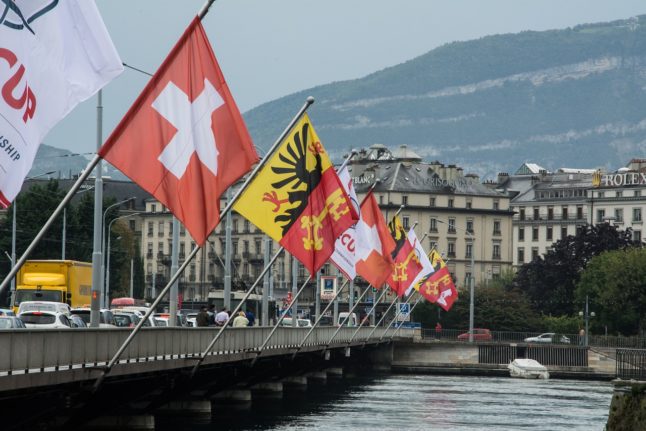When you mention Geneva to people living abroad, they imagine a city teeming with private banks and luxury brands.
All this is true, but there is much more to Geneva than just that.
To start with, Geneva is not just a city, but also one of Switzerland’s 26 cantons (officially called République et canton de Genève), though the canton is so small it is difficult to know when you leave the city part and enter the canton.
The canton part is made up of 45 communes; the total population of the city and communes is approximately 516,730 people, 41 percent of whom are foreign nationals, according to the cantonal statistic office (OCSTAT).
But that’s not all: since Geneva lies on the border with France, a phenomenon called ‘Grand Genève’ (Large Geneva) has emerged over the years. It refers not only to the city and canton itself (and even part of neighbouring Vaud), but also to the outlying French communes.
The agglomeration has some common infrastructure and shares public transportation, including the Léman Express, a train link covering 45 stations and 230 kilometres of track on both sides of the border.
READ MORE: How the new Léman Express train link will ease Geneva’s traffic woes
Now that the geography is clear, let’s move to some useful tips on making your life in Geneva (city or canton) easier.
Get the apps
The first thing you should do when you arrive in Geneva is download some very useful apps, which will help you better navigate local life.
One of the ‘must-haves’ is called ‘Geneva in your pocket’ (Genève en poche), which offers direct access to practical information about life in Geneva, including weather, maps, and calendar of sporting and cultural events.
It also contains a ‘street harassment’ tab, which allows people who are victims of inappropriate gestures or comments in the public space to immediately report the incidents to the municipal police.
This application can be downloaded on Google Play or in the Apple Store.
Other apps you will find useful are the ones for public transportation, recycling, as well as ideas for leisure activities.
You can find out more about these, and other, apps here:
7 essential apps that make life in Geneva easier for foreign residents
Finding an (affordable) apartment
Yes, this may sound impossible (or at least extremely difficult), as Geneva’s housing is the most expensive in Switzerland, and whatever dwellings are available for rent, are pricey.
We are not saying this is going to be easy, but there are ways to find a reasonably priced (by Geneva standards) flat.
The key is to avoid notoriously expensive areas like Colonge-Belleville, Hermance, or Champel, and focus your search on ‘cheaper’ (relatively speaking) districts, including Les Pâquis, Onex, Bernex, Plainpalais, Les Acacias, and Les Grottes.
Rents there are below the Geneva average.
READ MORE: Why is Geneva’s rent the highest in Switzerland?
Cheaper shopping
Just as Geneva’s rents are high, so are the prices of just about everything else.
If you want to save money on food and other products, do what thousands of Genevans have done for many years: go shopping across the border, to the neighbouring towns of the above-mentioned Grand Genève.
Groceries and many other consumer goods are about 30 percent cheaper in France than in the Geneva area, though this has changed somewhat due to inflation that is much higher in France than in Switzerland, as well as the franc being higher than the euro.
Generally speaking, however, you can still save by shopping across the border.

Regardless of exchange rate, Franc is still cheaper. Image by günter from Pixabay
Connect for free
Anything that is free in Geneva is…priceless!
Fortunately, that is the case with 635 free public Wi-Fi access points across 78 sites.
This link has all the information you need, including where and how to connect, as well as a map showing all the access points.
Make friends
Yes, yes, we know — easier said than one.
Switzerland does not have a reputation as the friendliest place on earth, but Geneva’s advantage is that it is has a large international community, so it could be simpler to get your social life organised here than in more ‘Swiss’ communities.
Thankfully, there are plenty of groups geared especially to foreign nationals, including English speakers, for instance, American International Club, Geneva Expats, InterNations, and others that can be found here.
Explore the surroundings
Geneva provides great opportunities to discover the area — not just in and around Geneva itself, but also in neighbouring Vaud as well as in nearby France.
For instance, small towns and picturesque villages around Lake Geneva on both sides of the border are easily reachable by car and public transportation (including a boat), and can be visited in just a few hours.
For example, you can take a ferry for a pleasant sail to visit the cobble-stoned medieval town of Yvoire in France.

Or the train from the Cornavin station will bring you, in less than an hour, to another beautiful town, Lausanne, with the possibility to stop on the way in small towns and wine-growing villages of Vaud.
The possibilities for day trips are endless.
Discover science
If you are interested in discovering the universe of particles, learning about the Big Bang, or just seeing where the Large Hadron Collider, the world’s largest and highest-energy particle collider, was built, visit CERN.
The European Organization for Nuclear Research, as CERN is called, operates the largest particle physics laboratory in the world, and guided tours of this fascinating facility are open to the public.
Be part of Geneva’s traditions
Held each December, L’Escalade commemorates the defeat of the Duchy of Savoy’s attempt to conquer Geneva in 1602.
This event is, according to the city’s official site, “a mixture of tradition, humour and official commemoration.”
And you will not feel like an intruder because l’Escalade “is not only an opportunity to remember the city’s history but also a time of togetherness. That is why l’Escalade is above all an everyman’s festival, the festival of the people of Geneva.”
Take the train to and from the airport
If you are coming to or leaving Geneva, the best and quickest way to get to the Geneva international airport is to take the train from the main (Cornavin) station.
The total trip is less than 10 minutes and costs about 3 francs (less if you have a half-tariff card).



 Please whitelist us to continue reading.
Please whitelist us to continue reading.
Member comments